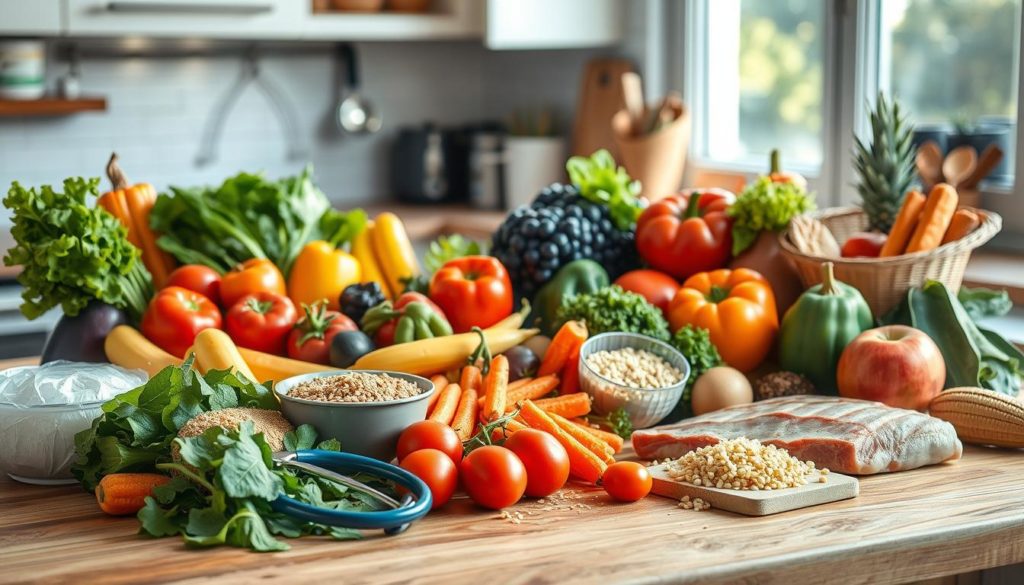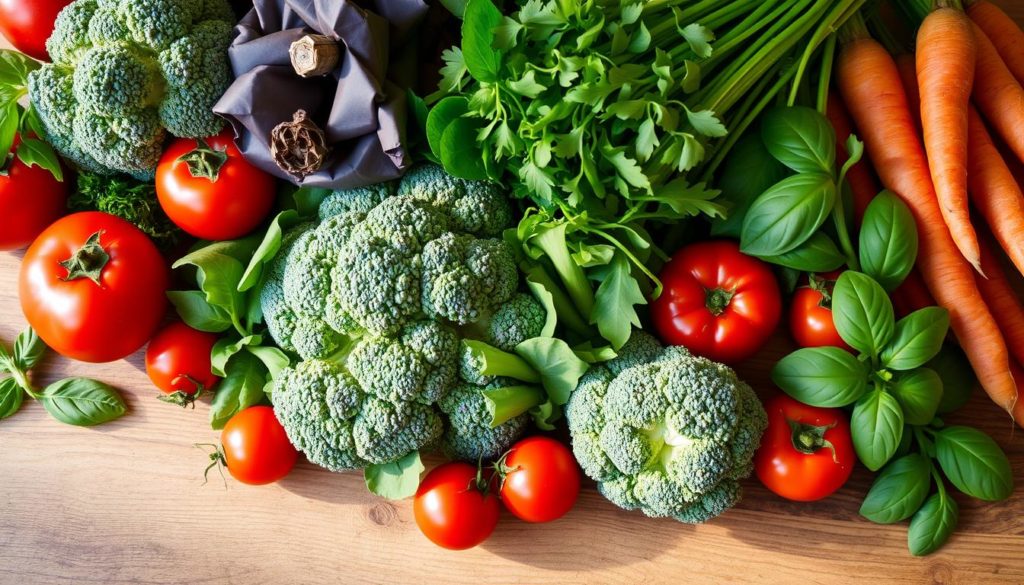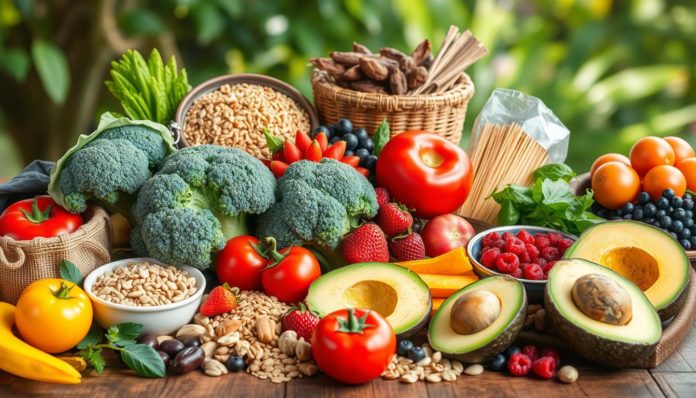Prostate cancer is the second most common type among American men, affecting nearly 1 in 8. The right diet plays a key role in preventing and managing prostate cancer. Our guide dives into the best diets and foods that support prostate health.
Making changes to your diet can help a lot with recovery from prostate cancer. It might even lower the chance of the cancer getting worse. Eat plenty of vegetables, like cooked tomatoes with olive oil, broccoli, and cauliflower. These foods are full of antioxidants that protect your cells. Avoid saturated fats found in red meat and whole milk since they’re linked to higher prostate cancer risks. Opt for fish, lean poultry, and plant-based proteins instead. While whole foods are the best for getting your vitamins, you might need vitamin D supplements after talking to a doctor.
Introduction to Prostate Cancer and Nutrition
Eating healthy is key for those with prostate cancer. Nutrition helps manage the disease and boosts overall health. Knowing what to eat can greatly impact a patient’s health journey.

A balanced diet improves treatment outcomes and may lower cancer recurrence risk. Research shows diet changes benefit prostate cancer patients uniquely.
Here are essential nutrition tips for managing prostate cancer:
- Increase intake of vegetables and fruits rich in antioxidants.
- Incorporate healthy fats and lean proteins into daily meals.
- Stay hydrated and opt for plant-based foods to improve fiber intake.
These diet tips help not just during treatment but enhance overall well-being. A focused diet aids in health management and recovery for prostate cancer patients.
The Importance of Vegetables in Prostate Cancer Prevention
Eating different vegetables can help a lot in keeping prostate cancer at bay. Fruits, veggies, beans, and grains are packed with vitamins, minerals, and fibers. They also have phytochemicals, which are great at fighting cancer.

Studies show that men who eat a lot of vegetables, especially types like broccoli, cabbage, and kale, face a lower risk of getting prostate cancer. These foods are part of a good diet for prostate health. They give you important nutrients and compounds that fight off the disease.
Antioxidants and Their Benefits
Vegetables are super effective against prostate cancer because they are rich in antioxidants. Carotenoids found in many fruits and veggies are especially important. They tackle free radicals, cutting down on oxidative stress and cell damage.
Eating all kinds of colorful veggies gives you lots of antioxidants. This strategy is key for prostate health. It makes sure you get all the good nutrients your body needs.
Optimal Fat and Protein Choices for Prostate Health
Making the right choices in fat and protein is key for prostate well-being. Cutting down on red meat, high-fat dairy, and processed meats can make a big difference. Instead, try adding more fish and plant proteins to your meals.
Plant-Based Protein Sources
Proteins from plants, like legumes, nuts, and grains, are packed with essential nutrients. They add lots of fiber to your diet, which helps protect against prostate cancer. Choosing these proteins is a smart move for anyone looking to eat better for their prostate health.
| Protein Source | Benefits |
|---|---|
| Legumes | Rich in fiber, vitamins, and minerals, providing long-lasting energy and satiety. |
| Nuts | Contain healthy fats and antioxidants, which support heart and prostate health. |
| Whole Grains | Provide a consistent source of energy and crucial nutrients like magnesium and iron. |
| Fish | High in omega-3 fatty acids, which are known to reduce inflammation and support overall health. |
Vitamins and Minerals: Focus on Food Sources
If you’re dealing with prostate cancer, choose foods over pills to get your vitamins and minerals. Calcium and vitamin D are very important for strong bones, especially if you’re on hormone therapy.
Calcium and Vitamin D
Eating foods rich in calcium and vitamin D is crucial for managing prostate cancer. Kale, spinach, soy products, and almonds are great for calcium. They keep bones healthy.
Vitamin D matters too. Sunlight is a natural source, but you might need more. Fatty fish, fortified cereals, and egg yolks are good food options. Always talk to your doctor about how much calcium and vitamin D you need. Sometimes, supplements are needed for your health. Keeping up with these nutrients helps maintain strong bones and overall health while fighting prostate cancer.
The Benefits of a Plant-Based Diet for Prostate Cancer
A plant-based diet is key in the prostate cancer nutrition guide. It focuses on fruits, vegetables, legumes, and whole grains. This way of eating brings many health benefits. It provides vital nutrients and supports overall food for prostate health.
High Fiber Content
Eating plant-based means getting lots of fiber. Fiber is important for food for prostate health. It helps remove harmful toxins and substances that could lead to cancer. Foods like whole grains, fruits, and vegetables are high in fiber. They help control hormones that could make prostate cancer worse.
Phytochemicals and Cancer Prevention
Phytochemicals are powerful compounds in plant foods. They include carotenoids and flavonols. These compounds fight cancer by getting rid of dangerous free radicals and lowering inflammation. Adding various colorful vegetables and fruits to your meals not only tastes good. It could also protect you from cancer.
| Plant-Based Food | Fiber Content | Phytochemicals |
|---|---|---|
| Broccoli | 2.6g per cup | Carotenoids, Flavonoids |
| Spinach | 2.4g per cup | Lutein, Zeaxanthin |
| Apples | 4.4g per medium apple | Quercetin, Flavonols |
Low-Fat Diets for Prostate Cancer Management
Switching to a low-fat diet helps manage prostate cancer and keeps the prostate healthy. It’s essential to cut down on saturated and trans fats found in red meat and dairy. This can lower the chance of prostate cancer spreading.
It’s also good to eat healthy fats and stay away from processed foods. These steps come highly recommended for patients.
Healthy Fat Choices
For a diet that fights prostate cancer, adding healthy fats to your meals is key. Foods rich in omega-3 fatty acids like salmon and mackerel are great. So are monounsaturated fats from olive oil.
These fats can lessen the risks of prostate cancer getting worse. Also, eating flaxseeds and walnuts offers more plant-based omega-3s. This helps keep the prostate in good shape.
Avoid Processed Foods
Stay clear of processed foods if you’re dealing with prostate cancer, as recommended by experts. These often have bad trans fats and too many omega-6 fatty acids. They’re not good for your prostate.
Try eating whole foods instead, like fruits, veggies, whole grains, and legumes. These aren’t just good for your prostate. They’re part of the best diet for battling this cancer.
Let’s look at different fats to consider:
| Healthy Fat Sources | Unhealthy Fat Sources |
|---|---|
| Olive Oil | Butter |
| Fish (Salmon, Mackerel) | Red Meat |
| Flaxseeds | Margarine |
| Walnuts | Processed Foods |
Choosing these low-fat, nutritious foods will help you manage prostate cancer better. This leads to improved health and better overall well-being.
Foods to Avoid with Prostate Cancer
When you have prostate cancer, what you eat matters a lot. Avoiding certain foods can boost your health and might even help your treatment work better. Here’s a list of foods people with prostate cancer should steer clear of:
- Red Meat: Eating too much red meat, especially if it’s processed or grilled at high heat, can increase cancer risks. It’s better to eat it in moderation.
- Full-Fat Dairy Products: These contain a lot of saturated fats and might make cancer grow faster. Choosing low-fat or plant-based options is smarter.
- Processed Foods with Hydrogenated Oils: Snacks, baked treats, and fried foods often have trans fats, bad news for your prostate.
- High-Sugar Snacks: Sugary treats and drinks can make you gain weight and cause inflammation, which is harmful for anyone with prostate cancer.
It’s crucial for those with prostate cancer to understand their diet. Saying no to certain foods can really help in controlling symptoms and improving your health. Check out the details below:
| Food Type | Examples | Health Impact |
|---|---|---|
| Red Meat | Beef, pork, lamb | Increases risk; linked to cancer progression |
| Full-Fat Dairy | Whole milk, cheese, ice cream | Loaded with saturated fats; not good for prostate health |
| Processed Foods | Packaged snacks, baked goods | Full of trans fats; bad for those with prostate cancer |
| High-Sugar Snacks | Soda, candy, pastries | Causes weight gain and inflammation |
Avoiding these foods can be a big help for anyone fighting prostate cancer. Making smart food choices is crucial for effective cancer management.
Hydration and Prostate Health
Staying hydrated is key for good health, especially for those dealing with prostate cancer. It helps the body in many ways, like moving nutrients, getting rid of waste, keeping joints moving smoothly, and controlling your temperature. For those on a high-fiber diet, drinking enough water is even more important. It helps avoid constipation and keeps your digestive system running well.
Water is the best drink for staying hydrated, but watch how much coffee and tea you drink. These can make you go to the bathroom more often, which might lead to losing too much water. Drinking a variety of fluids can help you keep enough water in your body. This supports both your diet for prostate cancer and your overall health.
Here are a few easy ways to stay hydrated:
- Carry a reusable water bottle and take drinks all day.
- Eat fruits and veggies that are full of water, like cucumbers and watermelons.
- Cut back on sugary drinks and choose water, herbal teas, or watered-down juice instead.
Making sure you drink enough water for your prostate health is a big step in taking care of your well-being. It adds to your nutrition plan and helps you stay healthy.
Managing Diet-Related Side Effects During Treatment
Prostate cancer treatments come with diet-related side effects. They impact appetite and how much you eat. It’s key to follow a special diet plan. This helps keep your weight healthy and gets you the nutrients you need during treatment.
Learning how to handle these side effects can really help. It makes treatment feel easier.
Strategies During Chemotherapy
Chemotherapy can change how things taste, decrease hunger, and cause mouth sores. But, there are ways to deal with these problems. Here’s what experts suggest:
- Flavored Hydration: Add slices of fruits like lemon or berries to water. This makes drinking water more fun.
- Seasonings for Taste Changes: Use different herbs, spices, and marinades. They help food taste better if your taste buds have changed.
- Small, Frequent Meals: Eating small meals often can help you get nutrients regularly. It also avoids the stress of big meals.
- Blended Foods for Mouth Sores: Blended or pureed foods are easy on mouth sores. They make eating and digesting easier.
Talking with a registered dietitian or nutritionist is a good idea. They can offer advice just for you. This advice will help you eat right and manage side effects, making treatment go smoother.
Prostate Cancer Recovery and Nutrition
Nutrition is key even after prostate cancer treatment. It helps with recovery and improves overall health. It’s important to eat a balanced diet rich in nutrients, especially for those recovering.
Eating more plant-based foods, lean proteins, and low-fat dairy is essential. This can help you regain strength and lead a healthier life.
Making healthy eating a priority can greatly impact your recovery from prostate cancer. Try to stay away from highly processed foods and red meats. Instead, eat plenty of fruits, vegetables, whole grains, and legumes.
These foods are packed with vitamins and minerals that help your body heal. Research shows that a diet full of healthy foods not only aids recovery. It also boosts survival rates after treatment.
For more information on what to eat, check out resources like this detailed nutrition guide. It’s also a good idea to talk to healthcare experts, like dietitians. They can make sure your diet meets all your needs during recovery.
FAQ
What foods should be included in a Prostate Cancer Nutrition Guide?
A Prostate Cancer Nutrition Guide should include foods full of antioxidants. Think about adding cooked tomatoes with olive oil, broccoli, and cauliflower. These aid in keeping cells healthy and fighting off harmful free radicals.
What is the best diet for prostate cancer patients?
The ideal diet for someone with prostate cancer has lots of vegetables, fruits, beans, and whole grains. You should eat lean proteins like fish and chicken instead of red meat and creamy dairy. Cutting down on saturated fats and choosing plant proteins helps too.
Which foods are beneficial for prostate health?
Foods great for your prostate are rich in antioxidants and nutrients that prevent disease. Eat lots of cruciferous vegetables, leafy greens, whole grains, and orange fruits like tomatoes and carrots.
What dietary changes can manage prostate cancer effectively?
To manage prostate cancer with food, eat less red meat, processed items, and sweets. Focus more on fish, beans, peas, and lots of veggies. Don’t forget to check your vitamin D and calcium levels, too.
Why are vegetables important in preventing prostate cancer?
Vegetables offer vital vitamins, minerals, fibers, and chemicals that fight cancer. Especially, cruciferous veggies help lower the chance of prostate cancer. A diet full of fruits and vegetables is key.
What protein sources are optimal for prostate health?
Great protein choices for a healthy prostate include plants like beans and grains, and lean meats like fish and chicken. These foods give you important nutrients and add to a diet that can help avoid cancer.
Should prostate cancer patients rely on supplements for vitamins and minerals?
Generally, it’s best to get vitamins and minerals from your diet. But, you might need extra vitamin D. Always talk this over with your doctor first.
What are the benefits of a plant-based diet for prostate cancer?
Choosing plants for your meals offers lots of fiber, which helps remove toxins and balance hormones. Plants also have special chemicals that protect against cancer, lowering your overall risk.
How does a low-fat diet help in managing prostate cancer?
Eating foods low in fats, especially the bad kinds like saturated and trans fats, is good for handling prostate cancer. Opt for healthier fats found in fish and olive oil instead.
Which foods should be avoided by prostate cancer patients?
Steer clear of foods high in bad fats, simple sugars, and red meat. Also, stay away from whole milk, processed items with bad oils, and sugary treats.
How important is hydration for prostate health?
Drinking enough water is key for a healthy prostate. Water helps carry nutrients, remove waste, and ensure everything in the body works well. This is really important when eating a lot of fiber.
What are the dietary strategies during chemotherapy for prostate cancer?
When going through chemotherapy, try adding fruit to your water, spicing up your meals, and eating small amounts often. If you get mouth sores, softer foods can help. Talking to a diet expert is a smart move for tailored advice.
How does nutrition impact prostate cancer recovery?
Nutrition aids recovery from prostate cancer by rebuilding strength. Eat plenty of plants, lean meat, and low-fat dairy while avoiding processed foods and red meats. This helps lower the risk of the cancer coming back.


